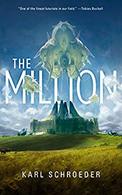
| Publisher: | Tor.com |
| Copyright: | August 2018 |
| ISBN: | 1-250-18541-6 |
| Format: | Kindle |
| Pages: | 192 |
This is an ebook, so metadata may be inaccurate or missing. See notes on ebooks for more information.
Gavin Penn-of-Chaffee should not exist. He lives on his family estate with his father and his brother (who suffers from brain damage from an accident), commands the household bots, and tries to keep his brother out of trouble, but no one can know that he is there. Only one million people are allowed to live on Earth, one million caretakers of the cities and wilds, one million people who are richer than any human has ever been but bound by treaties to very strict rules. One of those rules is that they never strain the carrying capacity of the Earth's ecosystem by allowing their numbers to increase.
Unfortunately for Gavin, his family is about to become involved in something far larger than his hidden existence. When the auditors attack their family mansion in force, it's reasonable to think someone may have tipped them off about Gavin's existence. But it quickly becomes clear that something else is going on, something murkier. With his father presumed dead and his brother arrested for his murder, Gavin stumbles into pretending to be a dead man to join the auditors, try to free his brother, and understand what's going on.
Schroeder is perhaps my favorite idea writer in science fiction, but he's not a very prolific one. This is his first book since Lockstep in 2014, and it's more of a novella than a novel. It's set in the Lockstep universe, although that's not immediately obvious at the start of the book, since Schroeder begins in media res and doesn't go back to fill in the bones of the world until Gavin ends up in Venice and auditor training. (Training classes are a good excuse for infodumps.) Gavin's world is the Earth of the Lockstep future, and the treaties the great families are following are (primarily) with the billions of humans sleeping away the years in cicada beds.
Schroeder does explain the world background here, but I'm not sure it would be a good idea to read The Million without reading Lockstep first, primarily because it's such an odd world setup that a bit more time to get used to it and think about the ramifications is useful. The concept is fascinating: what if we could drastically reduce the effective population without killing anyone, and use sophisticated automation and computer systems to let those people who are awake live like gods? Sadly, the technology is a bit less convincing. I'll give Schroeder a pass on the utterly reliable cicada beds that can be trusted to operate continuously for years or centuries, since a lot of science fiction stories need one piece of semi-magical technology, but Schroeder also assumes a lot in terms of near-instance manufacturing, vast arrays of bots, and rather magical acquisition of construction material with no sign of the material acquisition or recycling systems that must be in play. It's possibly believable given such a low population and thus low resource demand plus centuries of further technological development, but I would have liked to have seen more of the bones of that technology.
That's not the story Schroeder is telling here, though. Instead, it's a fairly simple story of political intrigue, stumbled across by two young adult protagonists. Elena, who we meet after Gavin, is far richer than his family is, one of the ruling Hundred elite, and is joining the auditors for family political reasons plus a dash of personal ethical idealism. The story and protagonists are mostly an excuse for numerous set pieces showing off what one million unbelievably rich and idle people might do to pass their time (answer: specialize in and attempt to become the best at some historic human activity), and the pageantry they create in the process to amuse themselves. It gets more interesting plot-wise towards the end, when Gavin finds some evidence of what's really going on, but it feels like a brief prelude for a larger story rather than a full story on its own.
All that being said, and despite the simple characterization and plot, I liked Gavin, enjoyed the second half of the story, and liked that the auditors were shown with a lot of nuance. They're not just villains, and Schroeder hints that Gavin's world may be based on a more complex foundation than he had expected.
This is more something to whet one's appetite between larger books than a stand-alone story. I mildly enjoyed it, but it's missable if you're not a Schroeder completionist. Hopefully it's prelude to a deeper and more complex novel in the same universe. I want to hear more about the AIs who represent natural resources! (Although I suppose I could just re-read Ventus.)
Reviewed: 2018-12-24